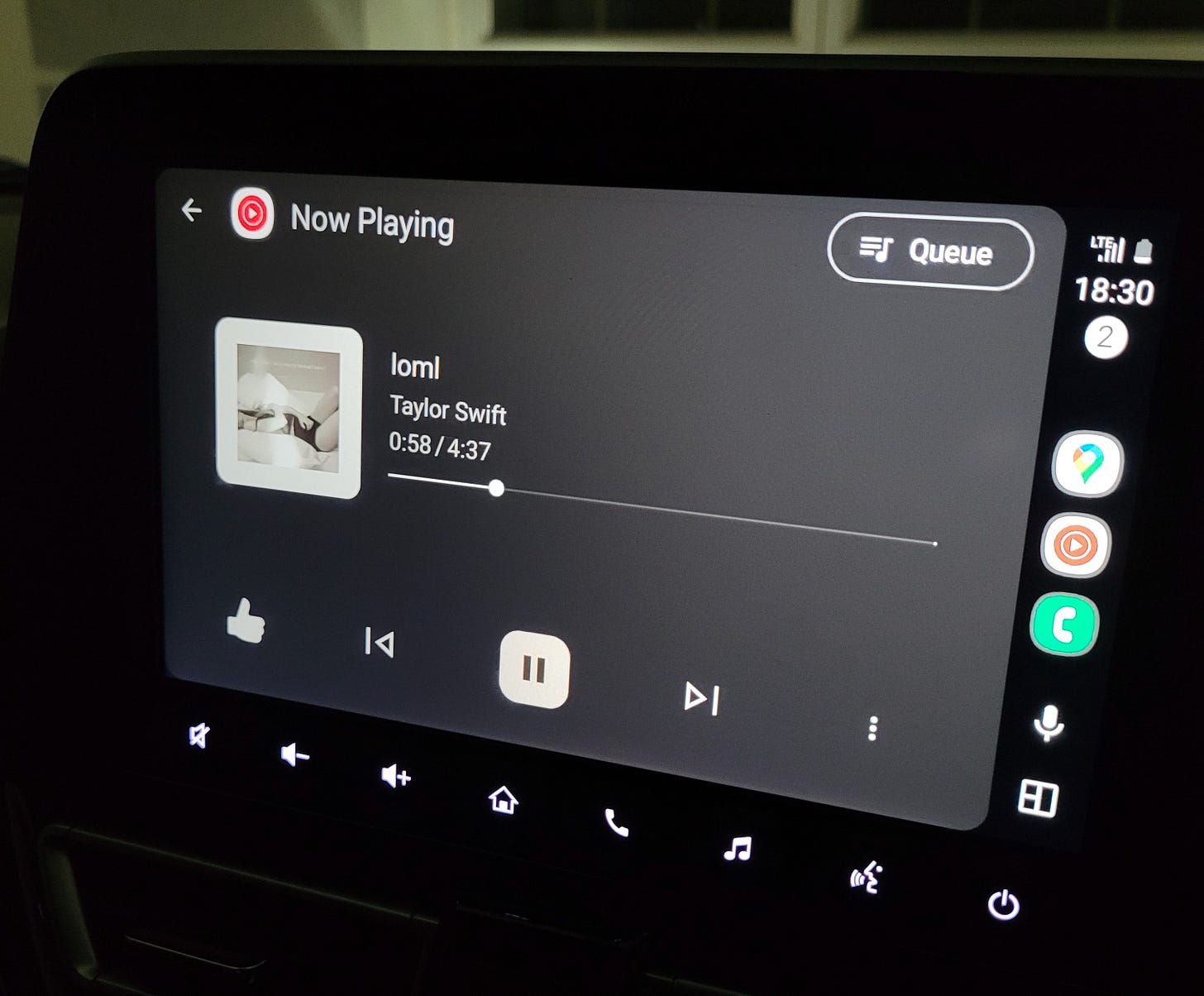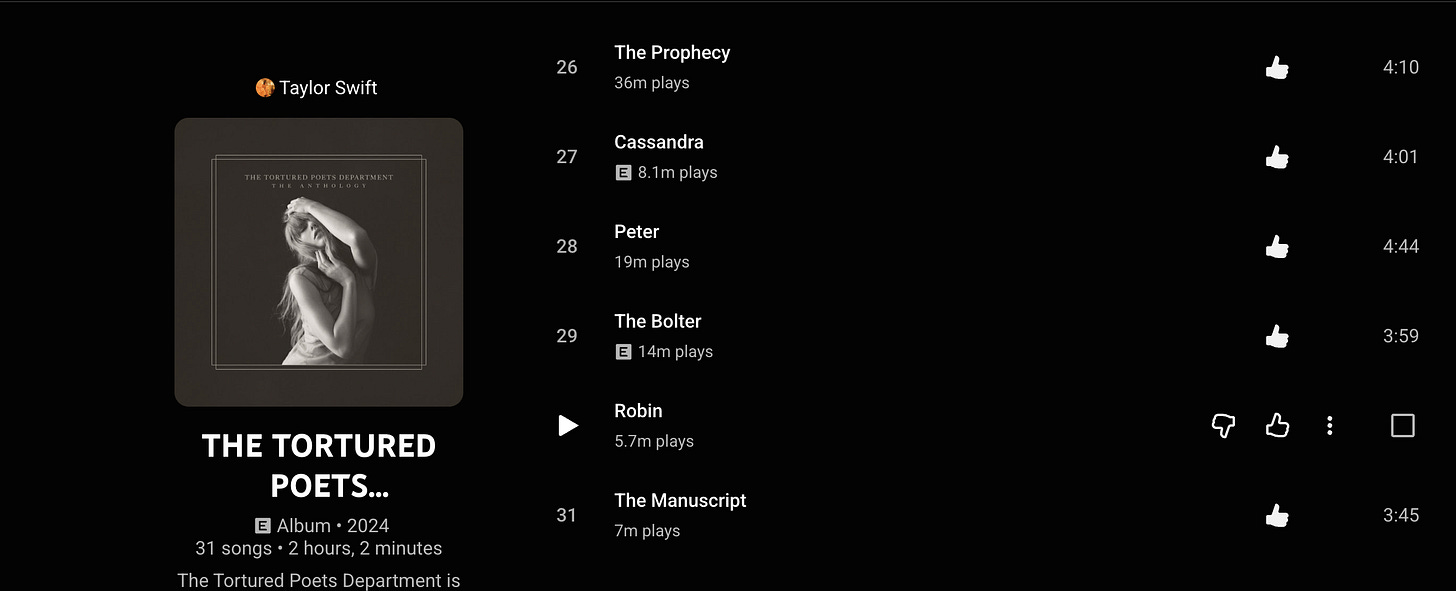The Tortured Poets Department Review: too bloated to be good.
I adore six songs on this album; the remaining, not so much.
When I think of tortured poets, I think of Charles Bukowski, Sylvia Plath, and Thomas De Quince—to name a few. I think of mould on broken whiskey bottles, sleeping pills churning inside the stomach, and snorting enough cocaine to start seeing things. Such predicaments are not analogous to the energy that picket-fence pop-star Taylor Swift usually exudes. This is perfectly fine, of course: there is no doubt that Taylor has endured her fair share of suffering over the years; and all suffering can be torturous, regardless of their form or potency. It is Taylor's job, however, to express this properly through music, and she fails to do so with most of the songs on this album: their production does not connote a meditative record; their lyrics are juvenile and pseudo-intellectual; and Taylor's tone and delivery on them are trashy. There is, therefore, a dissonance between the album's concept and its content, which, ultimately, makes The Tortured Poets Department a jarring, vexing, and outright embarrassing experience.
This is not to say that there are no good songs. There are six incredible songs that I am quite fond of—but we are talking six out of thirty-one here.
I will spend the rest of this review getting specific about some songs, both good and bad. I would like to start with the good ones.
***
I loved "loml". I visualise a non-malevolent, but hurt, ghost haunting a foggy cemetery and humming the song's melody in melancholy when I listen to it. The deep piano leads Taylor's sombre lyrics, from a gentle slow-dance to a fiery swirl, as a rumbling violin accentuates the final lines of the song: "Our field of dreams, engulfed in fire/ Your arson's match, your somber eyes/ And I'll still see it until I die/ You're the loss of my life". I can already see myself healing a heavy heart to it over a morning coffee.
"Chloe or Sam or Sofia or Marcus" has a beautiful piano melody that rises and falls rapidly, mirroring the eternally recurrent act of a lover melting the persona's heart, only to stab it with an icy knife, thereby rendering it frozen once again. The ending of the song is most curious: the high-pitched piano seems to tease the subject to come towards the persona; the tune then deepens, as upon his leaning in, she leans away.
"Cassandra" has incredible lyricism: "I was in my tower weaving nightmares/ Twisting all my smiles into snarls/ They say what doesn't kill you makes you aware/ What happens if it becomes who you are?" This track would accompany a phoenix rising from its ashes— with red-hot embers on burning wood and hazy vision from the heat.
I love how her enunciations match every piano key on "The Smallest Man Who Ever Lived"; it also has this escalating synth that feels like a machine gun firing at the song's subject. I adore the rippling, wave-like production on "imgonnagetyouback"; it is something that I would definitely put on my driving playlists. "The Albatross" is reminiscent of the woodsy-poet, strum your guitar by the fire energy that evermore had; I just wish it had more nuance to it: it begins very well but it does not have conflict, nor a climax.
Similar, but slightly diminished, sentiments apply to "How Did it End" and "Peter" —they are good but nothing too special.
As much as I like these tracks, I cannot help but think of how inferior they are compared to Michelle Zauner's songs on Jubilee, a record with more poetry in lyricism than TTPD. Look at the opening lyrics to the intro track, "Paprika": "Lucidity came slowly/ I awoke from dreams of untying a great knot/ It unraveled like a braid into what seemed were thousands/ Of separate strands of fishing line/ Attached to coarse behavior, it flowed/ A calm it urged, what else is here?" Nothing from Taylor's new record can top this.
Let us now move on to the bad tracks.
***
All the songs that I am about to mention have production and vocal delivery that are symptomatic of Top 100 pop-trash—so not good.
"Fortnight" sets the tone for most of the songs on this album: a Lana del Ray aesthetic; soapy lyrics; and an anachronistic emo-energy. I suppose this is the "Karma" and "Anti-Hero" equivalent on this record: a straight to radio single. I understand the need for such songs, of course, but I never have been too fond of them —they stimulate me neither intellectually nor emotionally.
The title track has painfully annoying lyrics: "You smoked and ate seven bars of chocolate / We declared Charlie Puth should be a bigger artist." They probably work as insights into her and the subject's relationship but Charlie Puth is not that good of an artist—as fond as I am of "We Don't Talk Anymore".
"Down Bad"'s hook has Taylor's voice synthesized to sound like an off-tune string. I think it is meant to emulate drunkenness but if so, Taylor and her team might never have actually gotten drunk—because nobody inebriated has ever sounded like that.
Then there is the infamous "Touch me while your bros play Grand Theft Auto" on "So High School". Taylor has expressed her sensuality more subtly and cleverly on several songs in the past—"You got that long hair, slicked back, white t-shirt/ And I got that good girl faith and a tight little skirt", to give an example— so lyrics like these just gave me aneurysms.
By the time "Robin" came around, I was already well past my wit's end with this record and desperately wanted it to be over. Then came "Manuscript" with its lo-fi, sounds-to-study-to production and lyrics such as "if the sex is half as good, they'd be pushing strollers"; I closed the tab and stopped the listening session right then and there.
***
Over the last few days, I have become quite fond of "Chloe or Sam or Sofia or Marcus", "loml", "The Albatross", and "imgonnagetyouback"; I have added them to multiple playlists of mine and they are likely to stay there forever. It is most unfortunate that they belong on the latter segment of the album—I would imagine that most listeners might not even get to them unless Taylor has them out as official singles.
It is also unfortunate that the rest of the tracks are total duds. Bloating an album with unpolished and imprecise songs is, surprisingly, reminiscent of what Kanye—her foil, so to speak—has done with some of his records, such as Donda and Vultures. Bloat is unacceptable: why does your record have thirty-one songs when almost twenty-five are a definite skip on a second listen? "Fresh out the Slammer", "Who's Afraid of Little Old Me", "The Alchemy", "Clara Bow", and many others just do not make me feel anything. They should have been released later on a deluxe version of the record.
The songs that I did enjoy hint at so much potential that The Tortured Poets Department could have had if Taylor was more consistent with its overall tone; it could have been a sequel to folklore and evermore even. I mourn the thought of this hypothetical variant.



